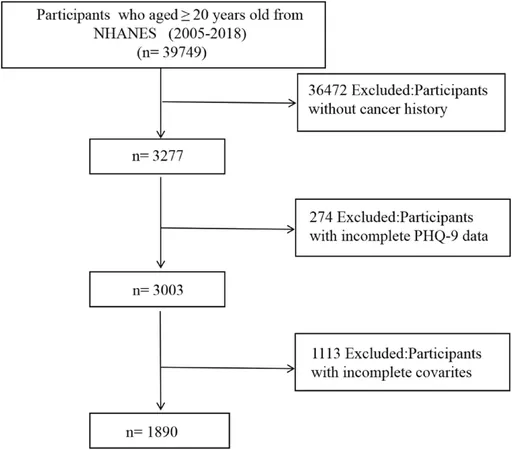
Revolutionary Study Reveals AI’s Ability to Predict Premature Deaths in Inflammatory Bowel Disease Patients!
2025-03-24
Author: Mei
A groundbreaking study published in the Canadian Medical Association Journal has unveiled alarming statistics: nearly half of individuals with inflammatory bowel disease (IBD) succumb to premature death. Using advanced machine learning models, researchers aimed to forecast mortality risks among this vulnerable population.
Canada holds one of the highest prevalence rates of IBD globally, which encompasses both Crohn's disease and ulcerative colitis. Individuals afflicted by these conditions often experience a significantly reduced life expectancy compared to the general population, frequently encountering additional chronic health issues tied to their IBD.
The study highlights a startling connection between the onset of chronic health conditions and the risk of dying prematurely—defined as passing away before the age of 75. Researchers discovered that when individuals develop such conditions early in life, their risk of premature death escalates.
By leveraging machine learning, the research team analyzed health care data from Ontario to explore whether existing predictive models could accurately forecast premature mortality in patients with IBD. This innovative approach could transform how healthcare providers monitor and manage the health trajectories of this group.
Dr. Eric Benchimol, a leading pediatric gastroenterologist at The Hospital for Sick Children, emphasized, "Recognizing chronic conditions diagnosed at an early age may hold significant weight in shaping a patient's future health prospects. While our findings are not causal, they shine a light on patients at greater risk for premature death, highlighting the need for more coordinated care."
Out of the 9,278 recorded deaths from 2010 to 2020, an astonishing 47% were deemed premature. The statistics further revealed a gender disparity, with men facing a higher rate of premature mortality (50%) compared to women (44%). The most frequent chronic conditions observed among those who died included various forms of arthritis (77%), hypertension (73%), mood disorders (69%), kidney failure (50%), and cancer (46%).
The research team noted that the inclusion of chronic conditions diagnosed before the age of 60—along with the age of diagnosis—greatly enhanced the predictive accuracy of their models. The implications are profound, as identifying premature death can spur health system improvements aimed at prevention and early intervention.
Co-led by medical student Gemma Postill and Dr. Laura Rosella, a Canada Research Chair in Population Health Analytics, this study aspires to uncover essential areas for follow-up care by various health professionals—from dietitians to mental health specialists.
The authors assert that these findings substantiate the necessity for multidisciplinary, integrated healthcare strategies throughout an individual's life, especially during critical phases of young and middle adulthood.
As the healthcare community grapples with the complexities of IBD, this study serves as a clarion call for prioritizing the management of chronic conditions to ultimately save lives. Will this revolutionary application of AI redefine patient care in chronic illnesses? The future of healthcare may depend on it!


 Brasil (PT)
Brasil (PT)
 Canada (EN)
Canada (EN)
 Chile (ES)
Chile (ES)
 Česko (CS)
Česko (CS)
 대한민국 (KO)
대한민국 (KO)
 España (ES)
España (ES)
 France (FR)
France (FR)
 Hong Kong (EN)
Hong Kong (EN)
 Italia (IT)
Italia (IT)
 日本 (JA)
日本 (JA)
 Magyarország (HU)
Magyarország (HU)
 Norge (NO)
Norge (NO)
 Polska (PL)
Polska (PL)
 Schweiz (DE)
Schweiz (DE)
 Singapore (EN)
Singapore (EN)
 Sverige (SV)
Sverige (SV)
 Suomi (FI)
Suomi (FI)
 Türkiye (TR)
Türkiye (TR)
 الإمارات العربية المتحدة (AR)
الإمارات العربية المتحدة (AR)